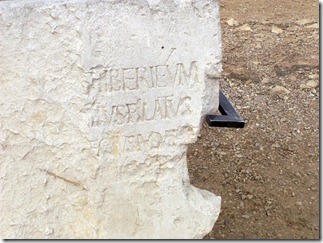
Names have been inscribed on marble, limestone, granite, caste in bronze and placed on many other materials in an attempt to carry them forward to be remembered by future generations. So many personal gravestone, so many memorials in small towns, the Viet Nam Memorial and now names around those holes in the ground in New York.
We will not forget.
Nor will I forget what Pilate had written on wood:
And Pilate wrote a title, and put it on the cross. And the writing was, JESUS OF NAZARETH THE KING OF THE JEWS. (John 19:19 KJV)
Sarcasm? Designed to strike at the leaders who sought Jesus’ death? We don’t know, and it really doesn’t matter. We do know that Pilate was above being politically correct.
Then said the chief priests of the Jews to Pilate, Write not, The King of the Jews; but that he said, I am King of the Jews. Pilate answered, What I have written I have written. (John 19:21-22 KJV)
Pilate did not say the title was true, just that he wrote it and it was going to stay there. Josephus wrote of Pontius Pilate, not favorably, yet for a couple of centuries he was looked upon as part of the Jesus myth, a character in a fairy tale, made up to be the bad guy. But, one who sees no error in the man he condemns to death.
Other than those who believed the Gospels to be factual representations written by men who were there, there was only Josephus’ confirmation and he’s known to embellish stories.
As often has happened with biblical history, confirmation comes from archeology. An inscription found in Caesarea Maritima, Israel, June, 1961, confirmed as authentic and is now in an Israeli museum, contains the Latin inscription translated here:
- To the honorable Augustus Tiberius
- ...Pontius Pilate
- ...prefect of Judea
- ...has dedicated [this]
When I was in school, my thesis was a pedantic “Archeological Discoveries and their Biblical Import.” The ones I wrote about then, and much discovered since then, confirm specific biblical entries. Nothing disproves, except mankind’s ability to ignore.
Isn’t it better to read, study, question, compare, learn? What the Lord says He requires is simple. Micah asked about what the Lord would require to forgive his sins. He lists sacrifices, including the offer of his first born, then answers his own question with what the Lord had shown:
He hath shewed thee, O man, what is good; and what doth the LORD require of thee, but to do justly, and to love mercy, and to walk humbly with thy God? (Micah 6:8 KJV)
No comments:
Post a Comment
Thank you for taking time to read and comment on the blog. Comments should take into consideration this verse: Finally, brethren, whatsoever things are true, whatsoever things are honest, whatsoever things are just, whatsoever things are pure, whatsoever things are lovely, whatsoever things are of good report; if there be any virtue, and if there be any praise, think on these things. (Philippians 4:8 KJV)